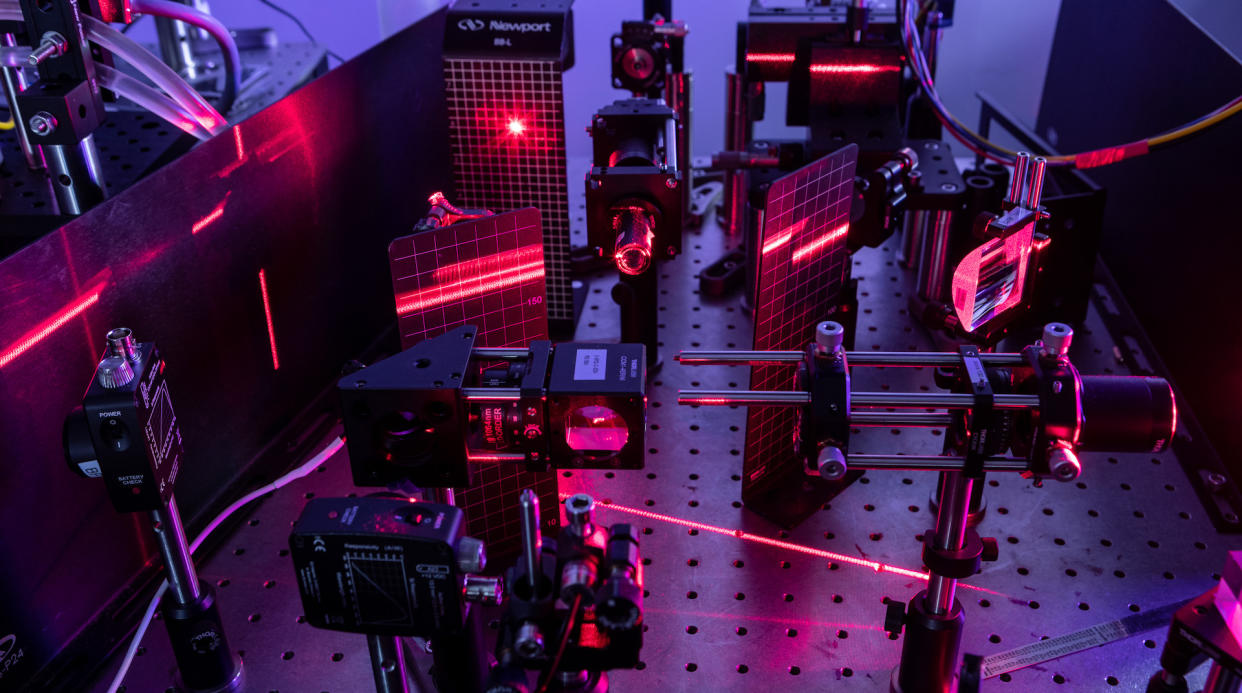'Quantum-inspired' laser computing is more effective than both supercomputing and quantum computing, startup claims

Engineers have developed an optical computer, about the size of a desktop PC, that can purportedly execute complex artificial intelligence (AI) calculations in nanoseconds, rivaling the performance of both quantum and classical supercomputers.
The computer, dubbed the LPU100, uses an array of 100 lasers to perform calculations through a process called laser interference, LightSolver representatives said in a March 19 statement.
In this process, an optimization problem that requires solving is encoded onto physical obstacles on the lasers' paths using a device called a programmable spatial light modulator. These obstacles prompt the lasers to adjust their behavior to minimize energy loss, similar to how water naturally finds the easiest route downhill by following the path of least resistance.
By quickly altering their state to minimize energy waste, the lasers achieve a state of minimal energy loss. This directly corresponds to the problem's solution.
The LPU100 then uses conventional cameras to detect and interpret these laser states, translating them into a mathematical solution to the original optimization problem.
According to the company, the LPU100 can perform complex operations such as vector-matrix multiplications — a demanding computational workload — in just 10 nanoseconds. That is hundreds of times quicker than the fastest graphics processing units (GPUs) can perform the same task.
Bob Sorensen, senior vice president of research and chief analyst for quantum computing at Hyperion Research, said in a statement that LightSolver's technology presented "a low barrier to entry for a wide range of advanced computing users."
Vector matrix multiplication is key to handling complex tasks involving a large number of potential outcomes. One example is the vehicle routing problem, a logistics challenge used in the transportation and delivery sector to determine the most efficient routes for vehicle fleets.
In benchmark tests published by LightSolver, the LPU100 identified the most efficient route for vehicle fleets in less than a tenth of a second — outperforming Gurobi, a commonly used logistics tool, which often failed to find a solution within 10 seconds.
Previous studies published by researchers at Cornell University found that the LPU100 outperformed traditional GPUs in Max-2-SAT challenges, which are used for testing the efficiency of logic-solving algorithms, as well as in the 3-Regular 3-XORSAT problem, a test for evaluating the performance of algorithms used for handling difficult problems that involve sorting through numerous combinations to find the best solution.
While the LPU100 employs what LightSolver dubs "quantum-inspired" technology, it doesn't rely on qubits nor the laws of quantum mechanics. Instead, it borrows the principle of processing multiple operations simultaneously at very high speeds, which classical computers cannot do.
According to LightSolver, the LPU100's laser array can handle 100 continuous variables, theoretically allowing it to address computational problems involving an astronomically large number of variable combinations (120 to the power of 100).
This makes it particularly well suited for industries such as finance, aerospace, logistics and manufacturing, all of which have resource-intensive data demands, the company said.
Quantum computers require extremely cold temperatures to operate and remain highly experimental, whereas supercomputers typically consume large amounts of energy and need to be housed in purpose-built facilities. By contrast, because the LPU100 lacks electronics, it can operate efficiently at room temperature and maintain a compact size — similar to a desktop computer.
RELATED STORIES
—'World's purest silicon' could lead to 1st million-qubit quantum computing chips
—Scientists create light-based semiconductor chip that will pave the way for 6G
—Light-powered computer chip can train AI much faster than components powered by electricity
It is also built entirely from "well-understood laser technology and commercially available components." This makes it a more practical alternative to resource-intensive quantum computers and supercomputers, LightSolver representatives said.
LightSolver now offers select enterprise customers the ability to use the LPU100 through its cloud platform for problems involving up to 1 million variables.

